
If they win 7 tricks they score 52, taking their score to 389. (Note: it is not necessary to keep track of overtricks separately as the cumulative number of overtricks taken appears as the final digit of the team's score, if positive).Įxample: Suppose a team whose score is 337 bids 5 tricks. Any bags beyond ten are carried over to the next cycle of ten overtricks - that is if they reached twenty overtricks they would lose another 100 points and so on. A side which (over several deals) accumulates ten or more bags has 100 points deducted from its score. Sandbagging rule: Overtricks are colloquially known as bags. Additional tricks (overtricks) are worth an extra one point each. Playing the first spade is known as "breaking" spades.Ī side that takes at least as many tricks as its bid calls for receives a score equal to 10 times its bid.

Example: South deals West bids 3 North bids 1 East bids 4 South bids 4.

There is no second round of bidding - bids once made cannot be altered. Unlike other games with bidding, there is no requirement for each bid to be higher than the last one, and players are not allowed to pass. Everyone must bid a number, and in theory any number from 0 to 13 is allowed. The bidding begins with the player to dealer's left and continues clockwise around the table. Each team adds together the bids of the two partners, and the total is the number of tricks that team must try to win in order to get a positive score. In Spades, all four players bid a number of tricks. The cards are shuffled and then dealt singly, in clockwise order beginning with the player on dealer's left, until all 52 cards have been dealt and everyone has 13.

The first dealer is chosen at random, and the turn to deal rotates clockwise. The cards, in each suit, rank from highest to lowest: A, K, Q, J, 10, 9, 8, 7, 6, 5, 4, 3, 2. Deal and play are clockwise.Ī standard pack of 52 cards is used.

The four players are in fixed partnerships, with partners sitting opposite each other. Spades for Four Players Players and Cards I am grateful to Theodore Hwa, Dennis J Barmore, Szu Kay Wong, John Hay, Daniel Hines, and many others who have contributed information on variations. It is most often played as a partnership game by four players, but there are also versions for three, two or six players. Spades is a plain-trick game in which spades are always trumps. After the main description, there is a collection of numerous variations, which are still common in face to face social games. The introduction of of on-line play and tournaments has also led to some standardisation of the rules, and this page has been revised so that the main description conforms to the standard. However, since the mid 1990's Spades has become popular internationally because of its easy availability in on-line card rooms on the Internet. Until recently it has been little known elsewhere, except in a few places where American troops were stationed, for example in parts of Germany. Spades was invented in the USA in the 1930's and is played quite widely in that country.


 0 kommentar(er)
0 kommentar(er)
